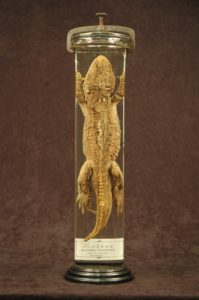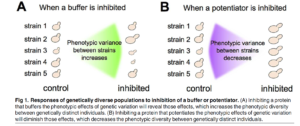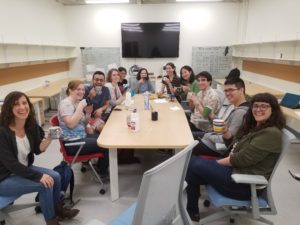 The winning tea of the Chen Lab Tea Bracket this year was Kusmi Anastasia. After weeks of rigorous tea tasting, Dr. Nancy Chen won the bracket and is said to still be basking in the coveted Tea Bracket glory. This Tea Madness is going to be an annual tradition, with other labs invited to participate with nominating tea challengers, filling out tea brackets, or just coming to tastings.
The winning tea of the Chen Lab Tea Bracket this year was Kusmi Anastasia. After weeks of rigorous tea tasting, Dr. Nancy Chen won the bracket and is said to still be basking in the coveted Tea Bracket glory. This Tea Madness is going to be an annual tradition, with other labs invited to participate with nominating tea challengers, filling out tea brackets, or just coming to tastings.
E2G2 Seminar May 17th
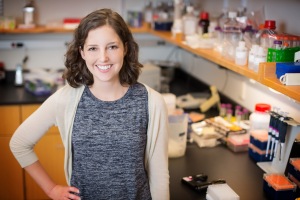
Join us in Hutchison 316 at 3 pm for Dr. Molly Schumer‘s talk titled “Natural selection on hybrid genomes: Insights from swordtail fish”. See you there!
Howard Bryant Endowed Scholarship Cornhole Tournament
Please join us tomorrow at 3:30 in Genesee Valley Park to participate in a cornhole tournament and a BBQ dinner. All proceeds from the tournament benefit the Howard Bryant Memorial Scholarship Fund. Howard was a beloved member of the Department of Biology at the University of Rochester for over 40 years. The Howard Bryant Fund was established in 2004 to honor Howard’s legacy of caring and support by providing aid to students in need of financial assistance and who are interested in pursuing a career in sciences or engineering.
Jillian Ramos wins Three Minute Thesis competition
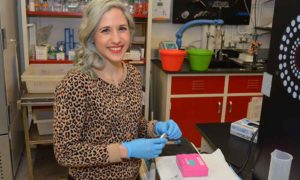 Jillian Ramos, a PhD student in Dragony Fu’s lab (part of the Molecular, Cellular, and Developmental Biology program) won first place in the Three Minute Thesis competition. To win this competition, students have to explain their complicated research in a way that a general audience can find accessible. The catch, you have to do this all in under three minutes! Jillian presented her work called: Modify or Die: When Protein Translation Goes Awry and successfully captured first place prize as well as the people’s choice award.
Jillian Ramos, a PhD student in Dragony Fu’s lab (part of the Molecular, Cellular, and Developmental Biology program) won first place in the Three Minute Thesis competition. To win this competition, students have to explain their complicated research in a way that a general audience can find accessible. The catch, you have to do this all in under three minutes! Jillian presented her work called: Modify or Die: When Protein Translation Goes Awry and successfully captured first place prize as well as the people’s choice award.
Congrats Jillian! Read an article about the competition and a transcript of Jillian’s presentation here.
Wardproject.org is live!
The specimen collection in the Biology Department (click here) is re-emerging even further into the public eye (see here for background) with the launch of the website wardproject.org.
The website links our collection to material in the Department of Earth and Environmental Sciences and related catalogs, bulletins and correspondence housed in the Department of Rare Books, Special Collections, and Preservation. The combination of information on biological material with historical information will provide scientists, historians, and archivists a detailed look into the period between the Civil War and 1900 when the study of natural history grew rapidly worldwide. Powered substantially by undergraduate interest, the website at present is embryonic. However, the content will evolve rapidly. When you visit, be sure to check out the 3D images of specimens with technology developed in part by the River Campus Libraries’ Digital Scholarship Lab.
Journal Club on 2/12/18
Hey guys, join us for our next journal club (2/12) from 12:30-2pm. Nilima will be presenting faculty candidate Dr. Leila E. Rieder’s “Histone locus regulation by the Drosophila dosage compensation adaptor protein CLAMP” paper. 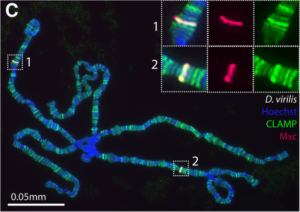
Peachy Outreach
We had an absolute blast this morning working with local 5th graders and sharing what it’s like being a scientist! After hearing the whole school sing their Welcome Song, we were pumped to sing the praises of the daily joy of being scientists. We showed their class some vogue mutations of Drosophila, how starved ladybugs interact with scrumptious aphids, and how specimens are preserved, both by humans (herbarium press) and nature (fossils).
Here is an artistic rendition of the enterprise drawn by a talented 5th grader:
Here Jenn is answering questions after the students watched many aphids die at the hands of ladybugs. Note the variation in facial expression.
Omid discussing the process of fossilization proceeding a lively herbarium press and leaf morphological diversity discussion. It’s difficult to say who learned more, me or the students.
Cara engaging her group discussing the inspirational Ms. Frizzle and physiological consequences of common Drosophila mutations.
All in all, we’re very honored to be invited and engage with such incredibly enthusiastic 5th graders. Furthermore, we recognize how effective a welcome song is on invited guests…
Journal Club Feb 6, 2018
Journal Club 01/30
As we discussed today in Journal Club, starting next week we will begin to read papers of faculty candidates aligning with their seminars.
Please join us next Tuesday (1/30) from 12:30-2pm in Hutch 316 for Journal Club. I’ll be presenting Dr. Parker’s “Genotype specificity among hosts, pathogens, and beneficial microbes influences the strength of symbiont-mediated protection” paper. 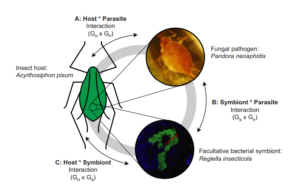
To bee or not to bee
Check out this recent article in the D&C “To bee or not to bee: Wasp population booms”. The article cites resident expert Bob Minckley on ways to differentiate bees from wasps.

